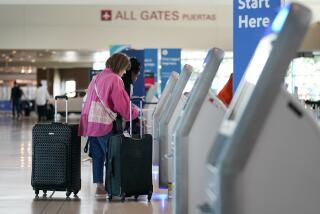Flying Tiger Gives Its Pilots a Deadline
- Share via
Flying Tiger Line, the world’s largest air cargo carrier, has given its 650 pilots until Nov. 14 to agree to drastic wage and benefit concessions.
Stephen M. Wolf, chairman of money-losing Flying Tiger, asked the pilots to accept 25% wage cuts and a $10-million reduction in other benefits. Wolf, who joined the airline from Republic Air in August, also seeks to establish a two-tier pay scale at Flying Tiger, under which newly hired pilots would be paid at lower rates.
Wolf outlined his proposal in an Oct. 24 letter to Ronald L. Burson, an official of the Air Line Pilots Assn. A copy of the letter was obtained by The Times.
Wolf said that if the company cannot reach an agreement with the pilots by Nov. 14, Flying Tiger’s board of directors will take “appropriate and necessary action regarding the company’s future.” Wolf did not say what action the board might take, but he has said previously that the airline might be forced to go out of business unless its unions grant major concessions. Wolf declined to comment Monday.
Wolf has been negotiating with Flying Tiger’s pilots since Aug. 19 in an effort to win wage concessions at the troubled air cargo carrier, which has lost an average of $74,600 a day since 1981. Last year, it lost $44.2 million on revenue of $1.1 billion.
Founded in 1945 by a group of former World War II pilots, Flying Tiger flourished until the deregulation of the airline industry in 1978 opened Tiger’s markets to competition from leaner, lower-cost air carriers. More recently, Tiger has faced pressure on its important Pacific routes from Nippon Cargo Airlines, a year-old Japanese freight carrier, and, to a lesser extent, from domestic airlines such as American and Delta that have gained additional landing rights in Japan.
The competition has severely eroded Flying Tiger’s share of the Pacific region air cargo business, which in 1985 provided 50% of the company’s revenue. Edwin C. Laird, a Seattle air cargo consultant, has estimated that Flying Tiger’s share of the U.S.-Japan cargo business--which makes up by far the largest part of Pacific region turnover--has declined to between 18% and 15% from 35% a year ago.
The wage concessions are part of a plan to restructure Flying Tiger’s finances to help reduce costs. The airline also wants to restructure some $300 million of its $525 million in long-term debt. However, the company has said that such a refinancing is contingent on getting wage concessions from its employees.
Burson, who heads the Tiger pilots group, could not be reached Monday, and a spokeswoman for the pilots union in Washington declined to comment on Wolf’s proposal. However, the pilots have already rejected an earlier proposal that called for a 20% wage reduction.
Flying Tiger’s pilots earn an average of $78,375 yearly, making them among the higher-paid pilots in the industry, according to Aviation Daily, a trade publication. Based on that figure, Flying Tiger would save $12.2 million yearly in operating costs if pilots agreed to 25% wage cuts.
Under Wolf’s proposal, wage cuts and other concessions would take effect Dec. 1 and would last for 42 months. The proposal also includes establishment of a profit-sharing plan for employees, under which 15% of Flying Tiger’s profits after the first $10 million would be distributed to employees. Wolf’s proposal also includes an employee stock-purchase program.
Flying Tiger employs 6,500 people, including 1,000 in Los Angeles. The company is attempting to reach an agreement with the pilots before seeking wage concessions from its other 2,200 employees who belong to other unions.
More to Read
Inside the business of entertainment
The Wide Shot brings you news, analysis and insights on everything from streaming wars to production — and what it all means for the future.
You may occasionally receive promotional content from the Los Angeles Times.










